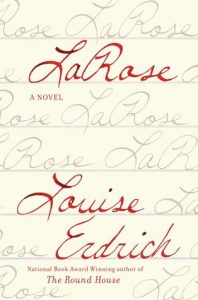LaRose
Louise Erdrich
Harper
Release Date: May 10, 2016
ISBN 978-0-06-227702-2
Last year, Louise Erdrich was awarded the Library of Congress Prize for American Fiction, honoring a body of work that has spanned over 30 years. In 2014, she won the PEN/Saul Bellow Award and the Dayton Literary Peace Prize Distinguished Achievement Award, both of which also celebrate a lifetime’s achievement.
With her 15th novel, LaRose, Ms. Erdrich has shown that she’s not done yet.
Louise Erdrich considers herself first and foremost a storyteller, coming from a mix of cultures – her father was German-American, her mother a Chippewa Indian. She is herself a member of the of the Turtle Mountain Band of Chippewa (Anishinaabe) Indians; most of her work depicts contemporary Native American life and encompasses the complexities of mixed heritages.
LaRose is no exception. Set in a North Dakota landscape familiar to her readers, this newest novel opens with tragedy: Landreau Iron kills his neighbor’s five year old son Dusty in a hunting accident on the land bordering their properties. Wracked by remorse and grief, he and his wife Emmaline turn to the wisdom of their Ojibwe ancestors, and as is tradition, heartbreakingly offer their own five year old son, LaRose, to the family of the dead child in an act of atonement. Our son will be your son now.
Emmaline is the half-sister of Nola, Dusty’s mother, but they have never been close; Landreaux and Peter Radich (Nola’s husband and Dusty’s father), however, have been good friends for many years even though Peter is a non-Native and his property is not part of the reservation. While Peter respects the traditions of the Native community, he does not feel obliged to understand or follow them and he is ready to refuse Landreau’s offer – until he sees Nola’s reaction.
And then he looked at Nola and saw that her face had broken open. All the softness was flowing out. And the greed, too, a desperate grasping that leaned her windingly toward the child.
So LaRose comes to live with the Radich’s, so as to help fix a broken family. But LaRose is not an ordinary boy. While he is a true child playing with action figures and Matchbox cars, genuinely sweet, he is also an old soul able to see and interact at times with the spirit world. Even his name comes from a long, almost mystical tradition: there has always been a LaRose in Emmaline’s family, back for generations, the name given to the healers, both innocent and powerful.
Yet there is so much broken in this community, in these families, these relationships, beyond Dusty’s tragic death, lining its way through generations and across cultures. Can the gentle presence of one boy really make that much of a difference in the face of so much distance, so much loss, so much suffering?
As with all of Louise Erdrich’s work, we get so much more than one single storyline, which is part of what makes her writing so generous and powerful. Here she goes back in time to the story of the first LaRose, a girl who is sold to a north country trader for booze and tobacco, who after a terrifying escape ends in a reservation school where they try to eradicate the Indian in her. (The effects of reservation schools throughout the generations is a constant theme in LaRose.) There is our LaRose’s grandmother, a former teacher, greatly beloved, now living in an assisted care facility. And Father Travis, the parish priest (who first appeared in Ms. Erdrich’s National Book Award winning novel, The Round House), a veteran with PTSD issues, whose spiritual discipline is sustained by his brutal physical regimen; and Maggie, Nola’s problematic daughter who lives in a constant state of fear and aggression – she is my favorite character. And then there is Romeo, a ner-do-well schemer, drug addict and dead beat who used to be Landreau’s best friend until their paths diverged after an abortive attempt in their teens to run away to the big city of Minneapolis. Romeo’s relentless charm and naive rationalizations would almost be almost humorous, were it not that there is so much squalor and sadness behind them.
All of these story lines form achingly beautiful verses in a song whose refrain is one of forgiveness. Can revenge be overcome? Should it? Can a person who has done terrible things still be loved? While LaRose may not be one of Louise Erdrich’s most explosive or passionate novels, it reverberates perhaps even more deeply because it is so restrained, so personal. So real.
Once again, this novel shows why Louise Erdrich is, and remains, not only a consummate storyteller, but a national treasure. For all its quietness, its sense of the ordinary, its humor, its pain and its despair, LaRose is a triumph.
~ Sharon Browning

